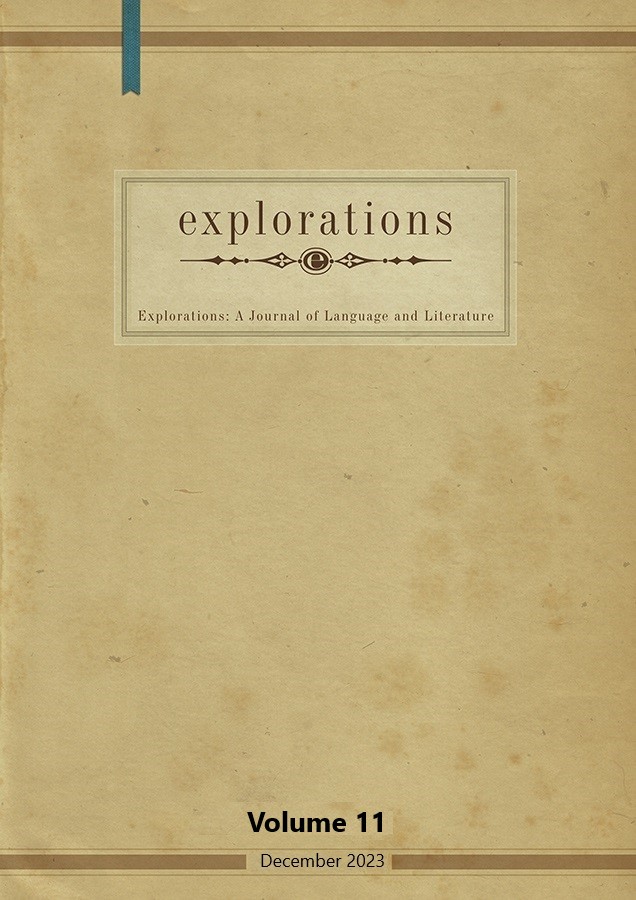Numer 11 (2023)
|
Spis treści
Strony
Pobierz
|
|||||
|
|
|||||
|
Streszczenie Here we are with the new (eleventh) issue of Explorations, a journal which is devoted mainly to what has been called, for better or worse, 'anglophone literatures.' As usual, we begin with an interview. In this issue you will find a conversation with Justin Quinn, one of the most interesting Irish writers and critics of the last decades (here we deviate a bit from the anglophone template). The interview deals with Quinn's poems and touches upon the questions of the poetic language, imagination and craft. We are also proud to present a new poem from Justin, a short and moving sonnet about the power of love and memory. The remaining part of the issue includes three articles (on Kipling, Augusta Webster and E. M. Forster) and a review. We hope you will find something inspiring in them, too. Enjoy. |
|||||
|
Jacek Gutorow
Interview. Close Quarters: Jacek Gutorow in conversation with Justin Quinn
DOI: 10.25167/EXP13.23.11.1
2 – 10
|
|||||
|
|
|||||
|
Dorota Osińska
Womanhood, Liminality, and Christian Iconography: Augusta Webster’s “Jeanne D’Arc”
DOI: 10.25167/EXP13.23.11.3
12 – 27
|
|||||
|
Słowa kluczowe liminality |Victorian poetry |Augusta Webster |Joan of Arc |medievalism |ChristianityStreszczenie Joan of Arc has been a figure of contradictions: initially a lowly maid, she remains one of the most significant individuals in French history. In the context of nineteenth-century literature, Joan of Arc attracted much attention from English poets by becoming a character who transcended the boundaries of time, place, and gender. The present article explores how in her dramatic monologue “Jeanne D’Arc” (1866) Augusta Webster (1837–1894) reinterprets the image of Joan of Arc to illustrate a complex interplay between women’s submission and emancipation. A close reading of the text, supported by the anthropological notions of liminal space as well as Christian iconography, shows how Webster perceptively addresses women’s experiences of isolation, self-assertion, and self-sacrifice. On the whole, her nineteenth-century reinterpretation of Joan of Arc exemplifies the creative use of Christian and, specifically, Catholic motifs to discuss issues relevant to the Victorian audience. |
|||||
|
Paolo D’Indinosante
A Tale of Two Imperial Poems: Rudyard Kipling’s “McAndrew’s Hymn” and “The Mary Gloster”
DOI: 10.25167/EXP13.23.11.4
28 – 42
|
|||||
|
Słowa kluczowe Rudyard Kipling |mobility |progress |dramatic monologue |empireStreszczenie The present article analyzes Rudyard Kipling’s “McAndrew’s Hymn” and “The Mary Gloster,” two poems which, since their book publication in The Seven Seas (1896), have been traditionally paired but more seldom jointly discussed at great length. Building upon previous scholarship on Kipling’s companion pieces, this article revisits them through the lenses of mobility and progress, focusing on the monologists’ anxieties about different forms of mobility-related progress and bringing their imperial subtext to the fore. The article argues that, taken together, the two halves of Kipling’s verse diptych illustrate a work ethos which appears to be subtly connected to empire-building and maintenance. INFORMACJE O AUTORZE
Uniwersytet Śląski w Katowicach
Sapienza Università di Roma, Włochy |
|||||
|
Magdalena Sroczyk
Through the Postcolonial Lens: The Point of View in the Television Series Adaptation of E. M. Forster’s Howards End
DOI: 10.25167/EXP13.23.11.5
43 – 56
|
|||||
|
Słowa kluczowe Howards End |colonialism |adaptation |point of view |attitude |imperialismStreszczenie The 2017 BBC television series Howards End not only constitutes another ‘retelling’ of E. M. Forster’s well-known story, but also illustrates how the perception of ‘reality’ portrayed in the narrative changes in the new version. As the article will argue, the representation of the British Empire becomes altered on the move from the novel to the series, largely as a result of the modifications in the point of view. Referring to the concept of ‘the point of view as attitude’ described by Edward Branigan and Seymour Chatman, the paper will examine the changes observable in the adaptation that result from the embracing of a more contemporary outlook on English society. Through highlighting the problems of imperialism as well as reflecting the post-colonial, multicultural character of England, the television series can be claimed to convey the critical attitude towards the British colonialism more explicitly than its source text. INFORMACJE O AUTORZE |
|||||
|
Krzysztof Gajda
Book Review: Sławomir Kuźnicki (2023), Na stykach iskrzy: literackie konteksty rocka (Sparking Points: Literary Contexts of Rock Music)
DOI: 10.25167/EXP13.23.11.6
67 – 68
|
|||||
|
INFORMACJE O AUTORZE |
|||||

